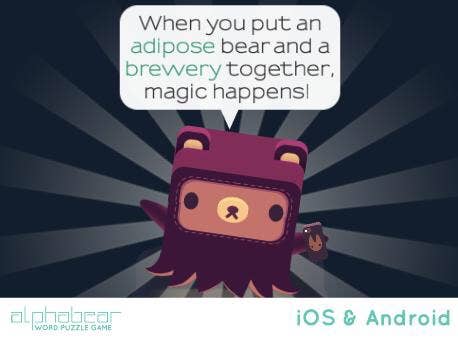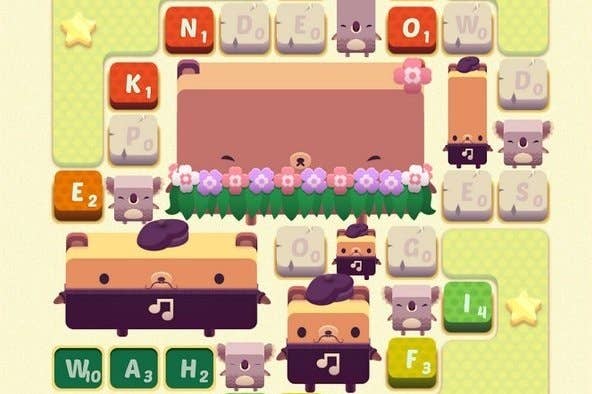Grind and bear it
Mobile hit Alphabear's infinite honey breaks the free-to-play formula, but makes for a hard-to-balance game
At first glance, Spry Fox's latest game, Alphabear, is set up similarly to many other free-to-play games. In order to enjoy a round of the ursine-themed word-finding gameplay, players typically have to pay a certain amount of honey. The honey recharges over time, so the requirement acts as a timed gating mechanism, making them wait a few minutes between rounds after they've exhausted their honey supplies. For those who want to play the game for more than a few minutes at a time, it's an annoyance, and one that, as per free-to-play tradition, can be alleviated by spending money.
However, where most free-to-play games would ask players to keep buying more honey every time they run out, Alphabear sells an "infinite honey" option for $5. As Spry Fox CEO David Edery told GamesIndustry.biz, Alphabear was intended to be something like a free demo, with the infinite honey purchase then unlocking the full game. It was a model adapted from Spry Fox's previous mobile puzzle-matching game Triple Town. It's not a complete break from the free-to-play formula, however. Alphabear also has a second currency (coins), which can be purchased or obtained slowly through play. Those coins can then be used to get access to levels with "rare bears" as rewards, and those bears in turn give players bigger bonuses when used in future sessions.
"I can't think of many successful free-to-play games (other than Triple Town) that sell infinite energy - it makes the game dramatically harder to balance and tends to really cap your upside, revenue-wise."
"From a monetization perspective, we were basically shooting for a hybrid of Triple Town and modern free-to-play RPGs with collectable creatures, like Puzzle & Dragons," Edery said. "We want people to feel like, 'I can spend just $5 on this game and have an experience that is far better than most single-player free-to-play games, and if I really love the game and can afford to do it, then maybe I'll spend a bit more to enhance my collection of rare bears.' I don't know if we quite nailed it, but I'm proud of our attempt. I can't think of many successful free-to-play games (other than Triple Town) that sell infinite energy - it makes the game dramatically harder to balance and tends to really cap your upside, revenue-wise."
As one might expect, infinite honey is the most popular purchase in Alphabear. On the iOS side, Edery said about half of the game's revenue comes from infinite honey, with the rest accounted for by sales of the coin currency and advertising that players can watch once a day in exchange for coins. On Android, he said the balance shifts a little more toward infinite honey. That's actually an improvement over Triple Town, where players apparently purchased the infinite turns option and called it a day. Edery said about 80 percent of Triple Town's revenue came from that initial unlocking purchase, with 20 percent coming from other in-app purchases.
While Spry Fox's approach to free-to-play makes the game friendlier up front, the balancing issues Edery alluded to become very clear the deeper into the game one gets.
"We have players who are literally playing for 5 or 6 hours every single day."
"It's still really grindy in the latter chapters," Edery admitted. "This is something we're constantly struggling with. We have players who are literally playing for 5 or 6 hours every single day. It is difficult to prevent them (and folks who play less obsessively, but still an hour or two every single day) from grinding through content faster than we can make it. This is one of the challenges that comes from selling infinite honey; most free-to-play games don't have this problem. We have a variety of ideas for making it less grindy while still keeping the hardcore players happily occupied, but it's going to take us time to try them out, toss out the ultimately bad ideas and refine the good ones. I'm excited and also a little intimidated by the challenge."
Edery said that as the developers have been tweaking Alphabear, retention has been steadily (but slowly) increasing.
"Alphabear is a pretty complex game; it has a lot of moving parts and there's no one piece of it that, if changed, would suddenly make a huge difference, I can tell you from experience!"
So far, Edery said Alphabear has 1.5 million downloads across iOS and Android, and adds a few thousand more on a daily basis, even when it's not being featured.
"Our average revenue per user (again, just like Triple Town) is on the low side as compared to other 'successful' f2p mobile titles, so we haven't felt like we can do much in the way of advertising; we have to rely on word of mouth and sharing. So far, that's been working out."

Anecdotally, the "sharing" Edery mentioned has worked well for Alphabear. At the end of every round, the game generates a series of Mad Libs-like sentences using the various words the player discovered on the board. It then prompts them to share the often nonsensical, occasionally profane results through Facebook, Twitter, and other means. Edery said there are too many variables for them to accurately track how effective the sharing mechanism has been, but he estimates that for every three people who download the game, one additional person will be motivated to try it because they saw a shared "bearpic."
While Edery compares Alphabear to Triple Town frequently, he draws fewer links to Spry Fox's more recent game, Road Not Taken. The PlayStation 4 and PC puzzle game launched last year, and even if it didn't seem to shape Alphabear, the studio still learned a lot from its first outing on consoles.
"I think one of the major lessons was that we need to pay more attention to what our art style and theme is telling players about our game," Edery said. "The average Steam and PS4 user looks at it, sees something cute, and expects 'casual' play. But Road Not Taken is anything but casual - it will chew you up and spit you out. That turned out to be a real problem for the game, I think. We knew this would be an issue and we tried to address it when doing PR stuff, but at the end of the day when you're the giveaway of the month on the PS4, the vast majority of people playing your game will be people who never heard of it before the day they downloaded it; you can't count on messaging of any kind to help you.
"The experience also reiterated something we already knew: that Spry Fox is a company that performs best when we're given the opportunity to iterate on our game for months if not years after launch. We like to make unusual games that evolve over time in response to community feedback. But traditional, premium console titles are generally expected to be 'perfect' at launch. That's a challenge for us. I'm reasonably certain we'll do another console title, but if/when we do, I doubt it will look anything like Road Not Taken."

